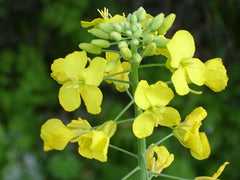Althaea officinalis - Marsh Mallow
Marsh mallow is often cultivated in the herb garden, as a culinary and medicinal herb as well as for ornament. Its roots were at one time the source of the sweet 'marsh mallow', but this sweet is now made without using the plant.
Marsh mallow is a very useful household medicinal herb.
Succeeds in almost any soil and situation, though it prefers a rich moist soil in a sunny position. It also tolerates fairly dry soil conditions.
Plants are hardy to about -25°c.
Sow spring or autumn in a cold frame. The seed is best sown as soon as it is ripe in late summer, the germination is often erratic. Stratification can improve germination rates and time. Prick out the seedlings into individual pots when they are large enough to handle and plant them out in the summer.
Edible uses:
Roots Boiled, Fried as a Pectin, Egg, Confectionary, Jelly Root - raw or cooked. When boiled and then fried with onions it is said to make a palatable dish that is often used in times of shortage.
The root is used as a vegetable, it is also dried then ground into a powder, made into a paste and roasted to make the sweet 'marshmallow'. The root contains about 37% starch, 11% mucilage, 11% pectin.
The water left over from cooking any part of the plant can be used as an egg-white substitute in making meringues etc. The water from the root is the most effective, it is concentrated by boiling until it has a similar consistency to egg white.
Leaves Raw, Cooked as a Salad, Potherb
Leaves - raw or cooked. They are used as a potherb or to thicken soups. When used as a small proportion with other leaves, the taste and texture is acceptable, but if a lot of the leaves are cooked together their mucilaginous texture makes them unpalatable. The leaves can be eaten raw but are rather fibrous and somewhat hairy, though the taste is mild and pleasant. We have found them to be quite acceptable in salads when chopped up finely.
Flowers Tea
A tea is made from the flowers. A tea can also be made from the root.



![Photo By Phil Sellens from East Sussex [CC-BY-2.0 (http://creativecommons.org/licenses/by/2.0)], via Wikimedia Commons](http://www.openpollinated.co.uk/cdn/shop/products/1_328da1e0-3b6e-4642-8bcd-9374da7d4985_thumb.jpeg?v=1510586879)






